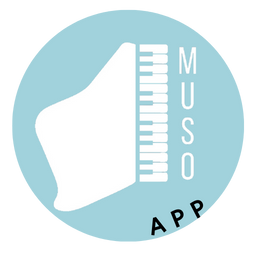Don't Just Review, Retrieve: How Muso Flash Cards Use a Med Student's #1 Study Hack
If you’ve ever spent an hour "practicing" notes with your child, only to feel like they learnt nothing, you’re not alone. The problem isn't your effort; it's your method. Traditional music practice often relies on passive repetition—theory books, revising basic flash cards over and over. But cognitive science has proven there's a far more powerful way to learn: Active Recall.
This is the same technique that allows medical students to memorize thousands of complex terms, and it’s the exact engine behind Muso Method's Flash Cards. Let's explore why actively retrieving information is the key to mastery, both in medicine and in music.
The Science of Active Recall: Learning by Doing (the Hard Work)
Active Recall is the practice of actively stimulating your memory before checking the answer. It’s the difference between:
-
Passive Review: Glancing at your sheet music and thinking, "Maybe that's a F" (This feels easy but leads to shallow learning.)
-
Active Recall: Counting and Looking between Lines 1 and 2 and forcing your brain to associate that position with 'F'. (This is easy for kids too, because kids love to show off their counting since they are 4 years old!)
But Isabelle! We use acronyms - isn't that the same? No. 4 year olds don't want to learn poems - they will get bored. You need to associate something they are already CONFIDENT at doing already. Which is counting!
You are not teaching an English class - you are teaching MUSIC. So utilize what they have already learnt at school and teach the new notes in less than 10minutes max.
The Med Student's Flashcard Playbook: How They Ensure Success
Imagine a med student facing a mountain of information—every muscle, drug, and disease pathway in the human body. Their most vital tool isn't a textbook; it's a deck of flashcards. Here’s how they use them for active recall:
-
The Question is Key: One side of the card has a prompt, like "Function of the Mitral Valve?" or "Side effects of Medication X?" The student must actively generate the answer from memory.
-
The Struggle is Productive: They don't flip the card immediately. They wrestle with the question, even if they’re unsure. This process of searching their memory is what solidifies the knowledge.
-
Instant Feedback: After attempting an answer, they flip the card for immediate correction. This feedback loop is crucial for correcting mistakes and reinforcing correct information.
-
Spaced Repetition: Cards they struggle with appear more frequently, while ones they know well are scheduled for later review. This ensures study time is spent efficiently on weak spots.
This method transforms them from passive readers into active retrievers of knowledge, building the robust recall needed for high-stakes exams.
Muso Flash Cards: The Same Science, Tuned for Musicians
Muso Method’s Flash Cards apply this exact same principle to music learning. We ask all music teachers to tell their students to:
1) Say
2) Play the note (on the piano/instrument)
3) Explain
Here’s how the comparison works:
| Med Student's Flashcard | Muso Method Flashcard | The Active Recall Principle |
|---|---|---|
| "Symptoms of Hypothyroidism?" | "Why is this note F?" | The prompt forces you to retrieve the information (counting the lines) from your memory, not just recognize it. |
| "Mechanism of Drug Y?" | "Where is this note on the piano?" | You must actively decode and action, moving beyond passive listening. |
| "Label this anatomy diagram." | "Clap the beat for me" | The task requires real-time application of knowledge under pressure, testing true understanding. |
When you see a Muso Flash Card or a note on the piece that says “D”, make sure to read the Muso Method tip we wrote. You need to explain. You must actively recall:
-
D is under Line 1
-
Where it is on the piano
This process builds what we might call "instrumental fluency"—the ability to recall and execute musical ideas on demand, which is essential for improvisation, composition, and playing with others.
Why This Method Creates Better Musicians
By gamifying active recall, Muso Flash Cards offer three powerful benefits over passive practice:
-
Deeper Memory: The effortful struggle of retrieval creates stronger, more durable neural pathways. You’ll forget a scale you mindlessly run, but you’ll remember one you had to actively recall under time pressure.
-
True Readiness: Music isn't a recital from memory; it's a real-time language. Active recall prepares you for the unpredictable nature of playing music, much like it prepares a doctor for a diagnosis.
-
Efficient Practice: Instead of wasting time on what you already know, the system (like a med student's spaced repetition app) focuses your energy on your weaknesses, maximizing every minute you spend with your instrument.
Tune Your Practice, Transform Your Progress
The next time you practice, shift your mindset from “I will review my scales” to “I will test myself on my scales.” This simple change is revolutionary.
Tools like Muso Method’s Flash Cards are so effective because they are built on the proven science of how our brains actually learn. The current flash cards are too passive - causing kids to guess and then they are Grade 5, struggling to complete a piece in 2 months.
We have taken the med student’s most powerful tool and tuned it for musical mastery.
So, put down the theory book for a moment. Pick up Muso Flash Cards—and start our Muso Method Active Recall Games:
1) Say, Play, Explain
2) Shuffle and Play
3) Spin and Play
More examples on www.musomethod.app or @musomethod on Instagram.
Isabelle Ng
Isabelle Ng

